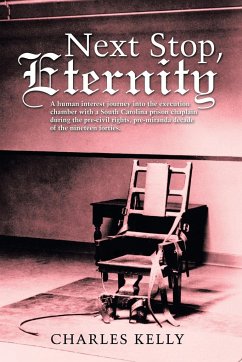The late Reverend C. M. Kelly witnessed thirty-four executions while he served as the chaplain for the South Carolina State Penitentiary. Sue Logue, a school teacher, was the first woman ever electrocuted in South Carolina-with a dispute over three dollars leading to eight deaths. From Sue Logue to George Stinney Jr., a fourteen-year-old black youth who was executed for the murder of two white girls-his conviction now overturned in 2014-Rev. Kelly's powerful accounts reflect the uneven social conditions of the twenties, thirties, and forties. In Next Stop, Eternity, author Charles Kelly shares both the history and moving personal accounts of the thirty-four executions his father C. M. Kelly witnessed during his death-house ministry in South Carolina. Rev. Kelly's ministry had a profound effect on those who were put to death, and the hope is that these stories shine a light on the crimes and punishments of this era-an era of racial tensions and controversy about the death penalty. As much about compassion, grace, and understanding as they are about justice, criminal history, and the law, Rev. Kelly's stories and personal accounts-along with his son's careful history-provide a compelling and engaging window into a charged time of American history, both social and legal. These stories illustrate the unjust racial conditions that were so prevalent during the 1940s and the extreme brutality of which human beings are capable, regardless of ethnicity, creed, or color.
Hinweis: Dieser Artikel kann nur an eine deutsche Lieferadresse ausgeliefert werden.
Hinweis: Dieser Artikel kann nur an eine deutsche Lieferadresse ausgeliefert werden.








